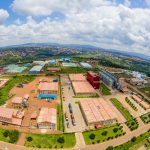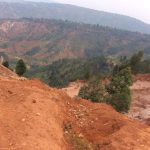
Gatuna Border – a border point between Rwanda and Uganda.
GATUNA BORDER – When Eric Gatabazi was arrested in 2022 trying to smuggle five jerrycans of the banned alcoholic drink Kanyanga into Rwanda, he thought he could pay a bribe and walk away.
Instead, he was sentenced to six months in prison and fined RwF 9 million (US $7,300). To pay the fine, his wife was forced to sell the family’s only property. “That broke me,” said Gatabazi (32), a soft-spoken man with determination in his voice. “We lost everything. I had to change,” he said.
Three years later, Gatabazi is one of the leading voices in Imboni z’Umupaka (Cross-border Watchdogs), a group of former smugglers working in Nyagatare District near the Gatuna border between Rwanda and Uganda. The group collaborates with Rwandan border police to dismantle the very criminal networks they once belonged to.

Patrolling the border area on foot, the former smugglers, mainly between the ages of 28 and 40, help to track smuggling operations and report suspicious activity to the police, while also working with vulnerable youths to guide them away from illegal cross-border trade.
“I used to make Rwf160,000 ((about $128)) per jerrycan” of Kanyanga, said Gatabazi, adjusting a faded baseball cap as he scanned a hillside for possible traffickers. “The money was good but risky. The fear. Always running, always hiding,” he said.
“Eventually, I realized I was destroying myself and others,” he added.
TRADE AND CONTRABAND
The border post, which Rwandans call Gatuna and Ugandans call Katuna, is one of the busiest in East Africa, with more than 3,000 people and at least 150 cargo trucks crossing there each day.
Rwanda depends on the border for much of its imports on a trade route through Uganda to Kenya’s Indian Ocean port of Mombasa. The route is also used to transport goods from Kenya and Uganda to Burundi and parts of eastern Democratic Republic of Congo.

Gatuna-Katuna is a hotbed for smuggling alcohol, cigarettes, cannabis, second-hand clothing, cosmetics, and plastic bags, which were banned in Rwanda since 2004. In 2019, when Rwanda closed the border after accusing Uganda of supporting rebel groups, smuggling intensified. Even after the reopening of the border three years later, illicit trade remained.
“Smuggling here is highly organized,” said one Rwandan border official, who spoke on condition of anonymity because he was not authorized to speak to the press. “People hide goods under tomatoes, in motorcycle compartments, even in children’s schoolbags. They know the terrain better than anyone. And that’s exactly why we now value the Imboni z’Umupaka,” he added.
TURNING THE TIDE
Charles Kanamugire, 29, another former smuggler from Karushuga, wears a stern look when he talks about his past. “I saw death many times. We used to run through forests, hide in trenches. I knew I couldn’t keep doing it,” said Kanamugire, who spent a year in jail for trying to smuggle two jerrycans of Kanyanga into Rwanda.
Now, Kanamugire and others patrol informal checkpoints across Nyagatare and Gatsibo, alerting police to suspicious activity. Their knowledge of smuggling routes makes them invaluable. “We’ve walked those paths ourselves,” he said.
Daniel Murenzi used modified bicycle carts with secret compartments to smuggle goods across the border. “We thought it was easy money,” said the former smuggler, “but the danger was real and one mistake could end your life.”
Data Behind the Fight
Rwanda National Police spokesman for Eastern Province, Hamdun Twizeyimana, acknowledged that collaborating with the Imboni z’Umupaka had helped curb illegal activities, with 292 drug-related cases recorded for the month between Feb. 23 to April 23, 2023.
Police seizures during this period included 150 kilograms of cannabis and 1,276 liters of Kanyanga, leading to the arrest of 234 suspects, figures show. Additionally, 133 cases of smuggling were intercepted, leading to the arrest 173 people for illegal cross-border activities.
Moreover, the Imboni z’Umupaka in Nyagatare District played a crucial role in apprehending smugglers involved in the trafficking of second-hand clothes, insecticides, plastic bags, onions, juices, tea, yeast, tobacco, and shoes from the Ugandan and Tanzanian sides into Rwanda, police said. The Kiyombe sector, located in the northern part of the district, served as a preferred route for smugglers from Uganda.
Statistics from the Revenue Protection Unit (RPU) indicate that from July 2017 to June 2018 some 40,000 liters of different liquors and 19,000 liters of soft drinks were confiscated at the Gatuna border, recovering taxes worth over Rwf595 million.
In November 2024, a joint operation by the Rwanda Revenue Authority (RRA), Rwanda Investigation Bureau (RIB), and the RNP intercepted smuggled goods valued at over RwF 460 million, including alcohol (a bottle of Hennessy XO worth Rwf 14 million), vehicle parts, cosmetics, and counterfeit goods, valued at about RwF 77 million.

Statistics by the Rwanda Revenue Authority (RRA) show that 1,430 anti-smuggling operations, recovering RwF14.6 billion in taxes, were conducted in fiscal year 2024/2025. Improved enforcement of tax arrears also led to the recovery of a staggering RwF 278 billion, it said.
RRA Commissioner General Ronald Niwenshuti said alcohol, used clothing, and cosmetics were the main items smuggled across the border. “Smugglers hinder the country’s development,” he said.
LEGAL CONSEQUENCES
According to Rwandan Law, Kanyanga is classified as a “simple narcotic drug” whereas cannabis is regarded as a “very severe drug.” Those found guilty of possession of a “very severe drug” could face life in prison and a fine of up to RwF30 million. Meanwhile, those caught smuggling “simple” drugs, faced up to 10 years in jail and a fine of up to RwF10 million, according to the law.
Eastern Province Governor, Pudence Rubingisa, acknowledged the important role played by former smugglers in combating smuggling. He said the province was examining ways to offer them more support and to improve their working conditions.
Currently, there are about 80 informal checkpoints manned by the Imboni z’Umupaka at Nyagatare, Gatsibo, Kayonza, Kirehe, Ngoma, and Bugesera, he said.
Rwanda police spokesperson ACP Boniface Rutikanga issued a strong warning to cross-border criminals: “Anyone caught engaging in malpractice and expecting leniency are mistaken.”
This story was supported by the Thomson Reuters Foundation as part of its global work aimed at strengthening free, fair and informed societies. Any financial assistance or support provided to the journalist has no editorial influence. The content of this article belongs solely to the author and is not endorsed by or associated with the Thomson Reuters Foundation, Thomson Reuters, Reuters, nor any other affiliates.






